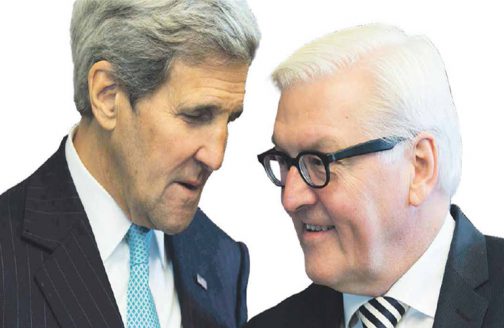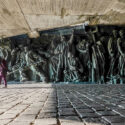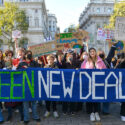The extraordinary career of Frank-Walter Steinmeier

Since its founding in 1949, the Federal Republic of Germany has had ten foreign ministers. The first three – Konrad Adenauer, Heinrich von Brentano and Gerhard Schröder – anchored Germany in the European Community and in NATO. The next three – Willy Brandt, Walter Scheel and Hans-Dietrich Genscher – initiated West Germany’s Ostpolitik, the détente that would ultimately lead to German reunification. Then Klaus Kinkel and Joschka Fischer set the federal republic’s course in the post-Cold War world. And finally, Frank- Walter Steinmeier took the helm at the foreign ministry from 2005 to 2009 for the first of Angela Merkel’s Grand Coalitions. After four years of Guido Westerwelle, he manned the office for a second time since 2013, and made Germany aware of its mounting degree of global responsibility.
When Steinmeier moved back into Werderscher Markt after four years as leader of the SPD in the Bundestag (and an unsuccessful 2009 campaign to become chancellor), the world had changed. This much was clear to him: “European and German foreign policy are facing turbulent times.” The disappearance of the “cynical stability of the Cold War,” as he put it, already had spawned a number of new, exceedingly dangerous regional confrontations – in Africa, the Near and Middle East, Afghanistan. Everywhere, crises and conflicts, archaic violence as well as struggles over power, hegemony and zones of influence were raging with no end in sight. The annexation of Crimea and Moscow’s interventions in Eastern Ukraine were threatening peace in Europe, as new conflict lines were emerging in Asia with the rise of China and India.
At the same time, the European Union was unraveling after having achieved 60 years of growing prosperity and peace among the states of Europe. The Brexit bombshell and the rise of populism in many EU countries has suddenly made it clear that European cohesion is in jeopardy, and that the process of European integration is not irreversible. The foreign minister could see more than just hairline cracks. “The world is out of joint,” Hamlet’s lament, became a frequent utterance of Steinmeier’s. He was also prone to describe the crumbling world order with an image from Robert Musil’s The Man Without Qualities: It is like “what happens when a magnet lets the iron filings go and they tumble apart again.”
Frank-Walter Steinmeier hails from the small village of Brakelsiek in the Lippe Uplands. His father was a carpenter and his mother a factory worker who had fled Breslau at the end of the war. He grew up in Brakelsiek, becoming the first in his family to attend high school, playing for the local soccer club, passing his a-levels and doing his military service with the air force, where he would reach the rank of Private First Class.
Steinmeier: Never succumb to speechlessness; it spells the death of diplomacy.
Architecture was an early interest, he played with the idea of becoming a journalist, but in the end he studied law, while also taking courses in political science. The 444 pages of his doctoral thesis focused on public policy regarding homelessness. There was little indication of a future career in politics.
“The time is out of joint—O cursèd spite/That ever I was born to set it right,” Hamlet’s plaintive turn was not yet on his mind, but Willy Brandt’s Ostpolitik had already politicized the high schooler. In 1975 he joined the Social Democratic Party (SPD), without yet becoming an active member. It was by coincidence that one of his former fellow students, who worked in the state chancellery of Lower Saxony’s Prime Minister Gerhard Schröder, suggested he move from academia to politics. Her name was Brigitte Zypries, later federal minister of justice and currently minister for economic affairs. He followed her advice and in 1991 was hired as media adviser. Soon he moved up, taking over the department of policy guidelines and interministerial coordination and planning.
It was the beginning of an extraordinary career. In 1996 he became state secretary and chief of the state chancellery in Hanover. After Schröder’s election as chancellor, Steinmeier became state secretary and commissioner for national intelligence at the federal chancellery in 1998, and chief of staff of the chancellery in 1999. Over the course of his career, Frank-Walter Steinmeier made good use of what the coach of his village soccer team had first appreciated: stamina and a big heart. He was no ball hog; he was a team player; he had enormous endurance; and he was a hard-nosed defender. He began as a power broker in the red-green coalition but soon played a crucial role in devising critical political strategy. He was the architect of reform for the economy and the job market, which – under the name Agenda 2010, then and still today contentious within the SPD – once again made the former “sick man of Europe” the continent’s leading economy. It was the gradual transformation of a political manager into a politician, and the last step before achieving the mantle of “statesman.”
When Steinmeier first became foreign minister in 2005, some doubted that he possessed enough foreign policy experience for the post. They were wrong. His role at the chancellery had been highly political. As coordinator for intelligence services, he was privy to information about the state of the world and intricately versed in all questions of international security. Since the Kosovo War in 1999, he took part in myriad foreign policy decisions, in particular about Europe. His influence was central when the government decided to send the Bundeswehr to the Balkans and to Afghanistan. After Sept. 11, his voice was decisive in formulating Schröder’s “no” to the Iraq War. He brushed off then US Ambassador to Germany Daniel Coats (now Trump’s director of national intelligence) in no uncertain terms: The SPD, he pointed out, is fundamentally a party of peace and is not on board for dubious escapades in the Middle East.
However, in those days Steinmeier operated behind the scenes, hardly visible to the public. In 2005, like any foreign minister, he was suddenly in the spotlight. But the job change could not have been much smoother. He was soon the most popular German politician.
Steinmeier has been served well by all the qualities for which he praises the people from his native Lippe: “disregard for any sort of formality or ceremony,” skepticism toward “blowhards and pipe dreamers,” being straightforward, down-to-earth and honest. His own predisposition corresponds to the virtues of his fellow villagers. He comes across as someone who is balanced, calm and persistent, sober and reflective, conscientious and composed. He has been called a problem solver, a “master of the unpretentious”, a “bridge builder”, a “ferryman between shores” – the “antithesis to the Trumps, Le Pens, Orbans and Hofers.”
These qualities of a patient pragmatist also inform his foreign policy. “He stands for indefatigability,” says President Joachim Gauck, “always ready to continue to negotiate, mediate and convince.” This was on display during his negotiations between the warring parties in Ukraine, in the 12 years of discussions with Iran, and most recently, yet still without results, in his efforts for a truce and peace agreement in Syria.
Steinmeier is a realist. Crises are the new normal, he has often said; crises and conflicts between states, but now ever often between states and non-state actors. Yet our age of perpetual crises has not discouraged him; it has inspired him. “Now more than ever!” was his motto. Do not give up. Do not entertain fear. Do not surrender hope or confidence. And never succumb to speechlessness; it spells the death of diplomacy. Keep the channels of communication open, and nourish them.
In his first tenure as foreign minister he strove for a modernization and innovation partnership with Russia. He regretted that Moscow’s offers for dialogue on collective security and an economic community stretching from Lisbon to Vladivostok was never taken seriously in the West. “Transformation through linkage” was his watchword. In Yekaterinburg in 2012 he sketched the image of a new balance of power, “in which the Pacific region, Russia, the European Union and Central Asia are linked to one another both economically and politically and profit from one another.”
The annexation of Crimea and the Russian intervention in Eastern Ukraine put a brutal end to this vision. Steinmeier condemned Putin’s breach of international law in clear terms. Nonetheless, he became the driving force behind the efforts to contain the conflict in Ukraine and find a political solution; Minsk Protocol I and II are largely his work. “And even though Minsk is not a perfect solution, and there is still much to do on both sides to implement Minsk,” he said in Washington in March 2016, “we would be in a much worse place without it.”
In the face of skepticism and criticism from the public, he continued negotiations with Russian Foreign Minister Sergey Lavrov. The continuation of the dialogue with Russia is a key question for Steinmeier: “Russia is a reality which we can’t ignore. For Russia has influence. It has influence in the Middle East, in Syria, in Europe, and beyond. So if we want to achieve solutions, we need to engage with Russia, even if it’s difficult.”
Difficult were also the years with George W. Bush in the White House. His secretary of state, Condoleeza Rice, and her German counterpart quarreled a lot. Steinmeier resisted dividing the world into good and evil, black and white. The rift reached its peak after Schröder’s refusal to join Bush’s coalition of the willing in the Iraq War.
“We need to establish anew our relationship to the US,” wrote Steinmeier after Barack Obama took office. And this was a success to the extent to which Obama, who was always more fixated on Asia, showed any interest at all in Europe. Steinmeier had a good, albeit not particularly warm relationship with Secretary of State Hillary Clinton. However, in his second stint as foreign minister he developed a wonderful friendship with his American counterpart, John Kerry. They had both known the highs and lows of a political career; one had lost a US presidential election, the other a campaign to become German chancellor. This shared fate bound them, as did the similarity of their world views and the understanding of their role as diplomats: Never give up; politics of hope, not fear; move forward, don’t retreat. CNN dubbed Kerry an unremitting optimist “who does not rest until he has made the very last phone call, bent every last ear, appealed to every last world leader who might help him in his quest.” They were birds of a feather in this sense above all others. Never before were German-American relations better than during the years of their service, which came to end almost simultaneously in January 2017.
While Kerry and Steinmeier were in office, the world underwent a fundamental transformation. Russia no longer sees itself as a partner of the West. The West, itself suffering from the bacillus of nationalism, is threatening to crumble – see Brexit, see Orban, see Trump. The Arab world has sunken into utter chaos. Africa continues to sway between hope and horror, while rising China and its authoritarian brand of capitalism shows little regard for human rights as it creates a state model that despots the world over love to emulate.
In this new normal, it is inevitable that more global responsibility falls on the shoulders of Germany. Frank-Walter Steinmeier was the first German politician to realize this. As early as in his first stint as foreign minister, he spoke – echoing the author Daniel Kehlmann – of the need for “remeasuring the world.” Germany, he argued, cannot afford to sit on the sidelines any longer. Indeed, it must be prepared to take on more global responsibility. At his swearing-in ceremony in 2013 he again alluded to this idea: “It is not that we needed to seek responsibility. We have it.” A few weeks later, the theme of “more responsibility” was the core message of his speech at the Munich Security Conference, as well as in the speeches by Germany’s President Joachim Gauck and Defense Minister Ursula von der Leyen.
Steinmeier has never been a rabid interventionist. Assuming greater responsibility – by this he meant not necessarily military intervention, but above all engaging more ardently in efforts to find peaceful solutions. Fear of the failure of one’s own initiatives was never justification for diplomatic reserve. “Diplomacy,” he said, quoting Willy Brandt, “is the General Staff work of peace.” He considered too narrow a focus on military options to be fatal; military strength must be accompanied by détente. In the Ukraine negotiations and in the discussions with Iran he showed the world what he meant, while continuing to caution the Germans against hubris: “We cannot take over the role of the US!” Not in the Near East, and certainly not in the Middle East.
When Steinmeier bade farewell to the foreign ministry for the second time, he ended his speech with a few thoughts that transcended the confines of his office:
“Parliamentary democracy is under pressure around the world; in many places it is being called into question. In too many countries, civil society and parliamentary opposition groups are facing increasing restrictions, and selfproclaimed ‘strongmen’ have even made contempt for democratic debate a governing principle. At the same time, the internet has created space for anonymous and uninhibited communication, in which each new wave of agitation generates more clicks than any facts or arguments, in which language has lost all moderation and the dividing line between the utterable and the ineffable is wearing increasingly thin.”
Anyone in attendance could very well hear the chief concerns the man from Brakelsiek will embrace upon taking residence at Schloss Bellevue in Berlin in his new post: President Frank-Walter Steinmeier of Germany.
A version of this article appeared in print in February, 2017, with the headline: From Brakelsiek to Bellevue



